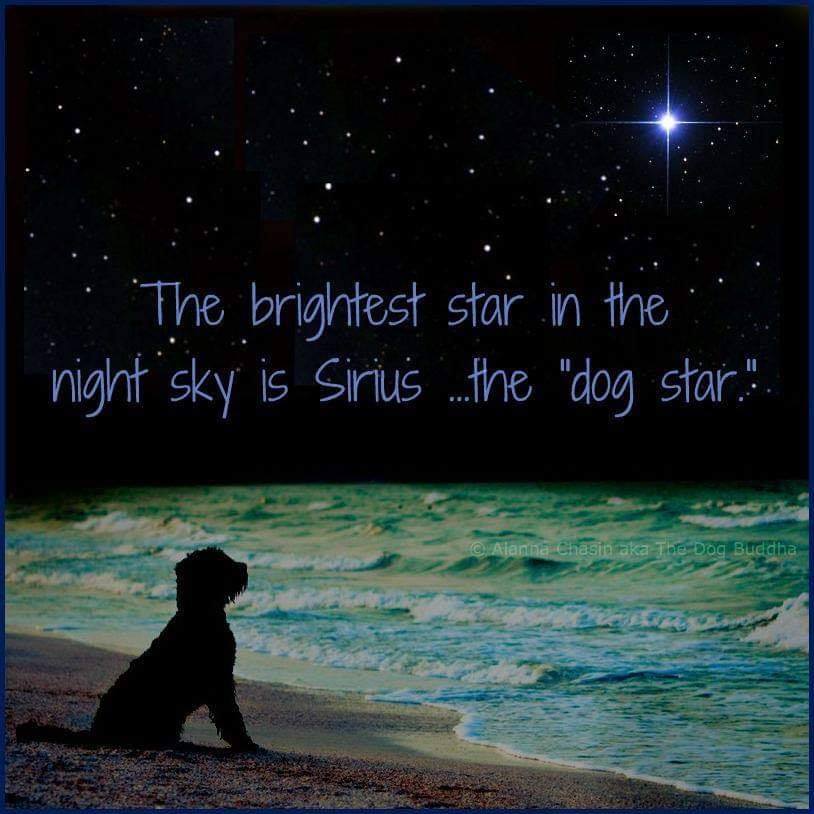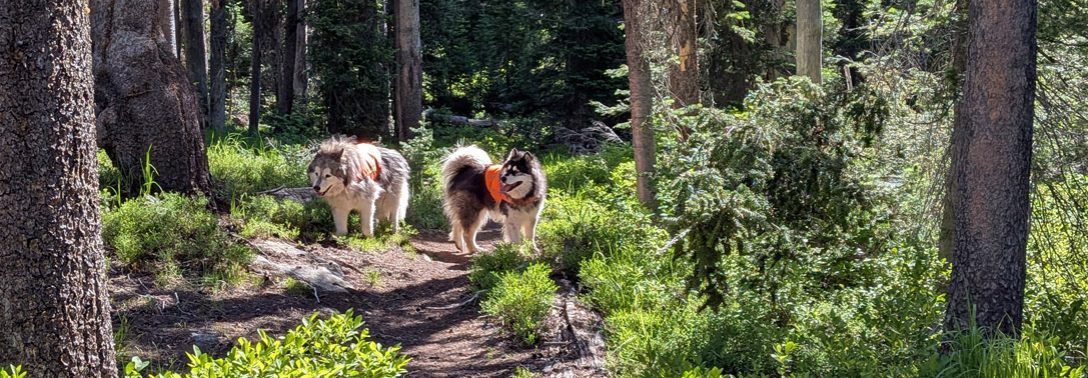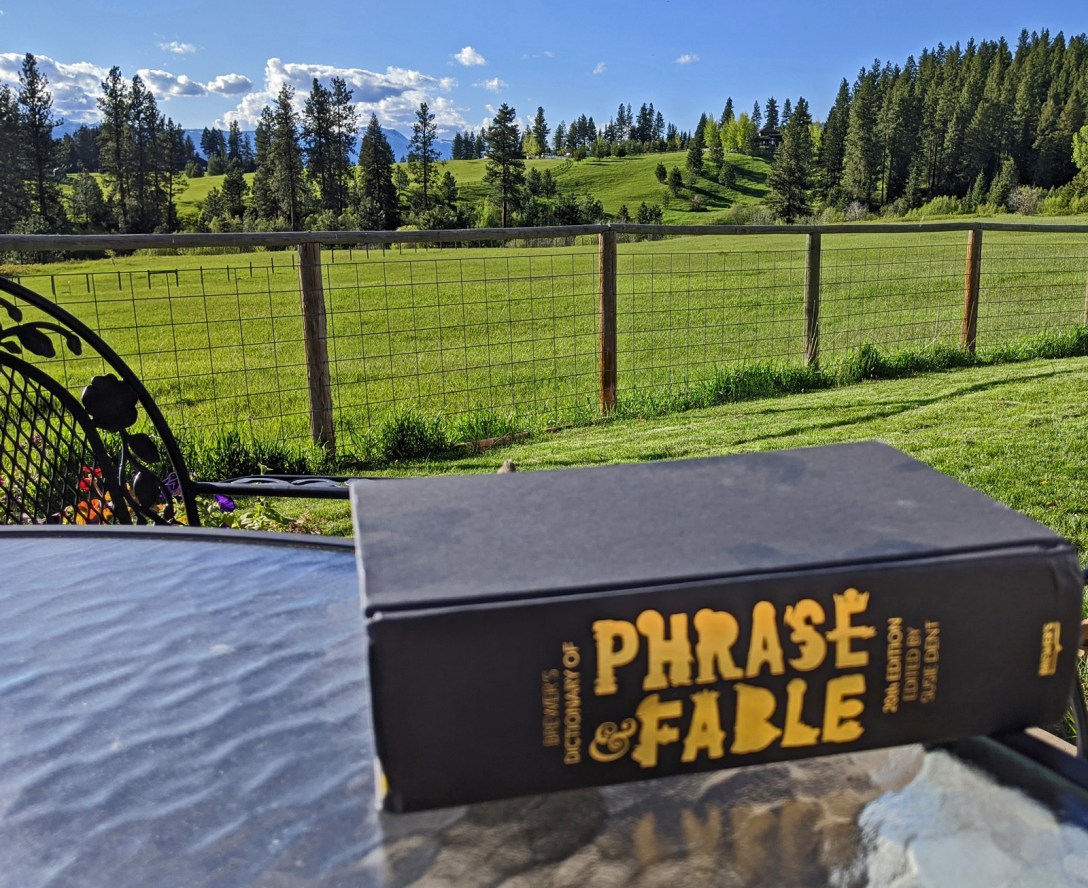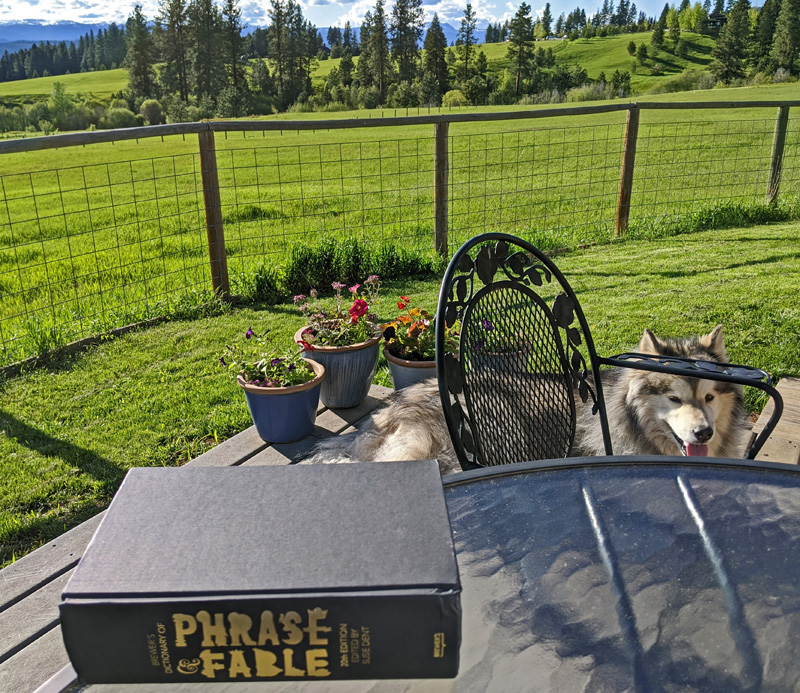A book review. Sort of.
First published in Britain in 1870, this curious dictionary is now in its 20th edition. Reading a reference to it recently, somewhere, I was intrigued and found a used copy via Amazon. It arrived from London a few days ago. At 2.5 inches thick, for this confessed etymologist it contains endless entertainment between its covers. (Yeah, I’m a word geek.)
Here’s a portion of the preface to the first edition, included in the current edition:
We call it a ‘Dictionary of Phrase and Fable’, a title wide enough, no doubt, to satisfy a very lofty ambition, yet not sufficiently wide to describe the miscellaneous contents of this ‘alms-basket of words’. As the Gargantuan course of studies included everything known to man and something more, so this sweep-net of a book encloses anything that comes within its reach. It draws in curious or novel etymologies, pseudonyms and popular titles, local traditions and literary blunders, biographical and historical trifles too insignificant to find a place in books of higher pretension, but not too worthless to be worth knowing.
…The labour has been the willing labour of an enthusiast, who has been for twenty years a ‘snapper-up of unconsidered trifles’.
Brewer’s Dictionary of Phrase and Fable
In Brewer’s Dictionary, within a definition, any word in all-caps leads to another definition, and so on. Down rabbit holes of obscure and perhaps useless information one falls, but what fun! (I checked and am disappointed to report that “rabbit hole” did not make it into Phrases and Fables.)
[Note: the book is published in Britain so there are the usual differences from US publishing norms in spelling (labour vs. labor; humour vs. humor) and punctuation (single quotation marks rather than double; commas and periods outside the quotation mark).]
I started playing with this treasure by finding one of my favorite words, DOG. That lead to 90 – yes, 90! – subcategories, including examples of phrases and appearances in history. Here are just a few:
Dog, The DIOGENES (412-323 BC). When Alexander the Great of Macedon introduced himself with these words: ‘I am Alexander, surnamed the Great’, to which the philosopher replied: ‘And I am Diogenes, surnamed the Dog’. The Athenians raised to his memory a pillar of Parian marble, surmounted by a dog. See also CYNIC.
[Looking up CYNIC I’m taken to a short paragraph describing the ancient school of Greek philosophers known as the Cynics, founded by Antisthenes and made famous by his pupil, Diogenes. That is followed by the subcategory Cynic tub: ‘the tub from which Diogenes lectured. Similarly, the ‘porch’ in Stoic philosophy, the ‘garden’ in Epicurean philosophy, and Academy of Platonic philosophy and the ‘colonnade’ in Aristotelian philosophy.’ Digonese lectured from a tub! You can see how one gets easily distracted when looking up words in this dictionary and following references included in the definition.]
Dog-and-pony show Derogatory US slang for an elaborate formal public occasion, especially a public presentation, as for a political party’s new manifesto. The allusion is to a travelling variety show in which dogs and ponies are the star turns.
Dog collar As well as its literal meaning, this is the popular name for a clergyman’s ‘back to front’ collar.
Dog days Days of great heat. The Romans called the hottest weeks of the summer caniculares dies. Their theory was that the DOG STAR, rising with the sun, added to its heat, and that the dog days (about 3 July to 11 August) bore the combined heat of both.

Dogface Originally, in 19th-century US slang, an ugly looking person. In the 20th century the word was applied as an insult by members of the US Marine Corps to infantrymen in the US Army, whom they looked down on.
Doggone A US EUPHEMISM for ‘God damn’.
But when that choir got up to sing.
I couldn’t catch a word;
They sang the most doggonest thing
A body ever heart!
WILLIAM CARLETON: Farm Ballads (1873)
Dog in the night-time, A An unconscious conniver; an unwitting party to a crime. The reference is to the dog in Sir Arthur Conan Doyle’s story Silver Blaze (1892), which did not bark in the night because it knew the man who took the horse from the stables. The exchange between Sherlock Holmes and Inspector Gregory is famous:
‘Is there any point to which you would wish to draw my attention?’
‘To the curious incident of the dog in the night-time.’
‘The dog did nothing in the night-time.’
‘That was the curious incident,’ remarked Sherlock Holmes.
Mark Haddon adopted the phrase for the title of his novel The Curious Incident of the Dog in the Night-Time (2003).
Dog rose The common wild rose (Rosa canina, Pliny’s kunorrodon), so-called because its root was believed by the ancient Greeks to cure the bite of mad dogs.

Dogs in classics and legend Among the better-known dogs of myth and legend are:
Arctophonos (Greek, ‘bear killer’) and Ptoophagos (‘glutton of Ptous’, a young man about whom little is known): the dogs of ORION
Argos (Greek, ‘shining’, ‘bright’): the dog of Odysseus (ULYSSES), which recognized his master after his return from TROY and died of joy
Bran: FINGAL’s dog
Cavall (Celtic ‘horse’): King ARTHUR’S favorite hound
Dragon: AUBRY’S DOG
Gargittios (perhaps from Greek gorgos, ‘fearful’) and the two-headed Orthos (‘straight’): GERYON’S dogs, both of which were slain by HERCULES
Gelert: Llewelyn’s greyhound; see also BEDDGELERT
Hodain or Leon (‘lion’) TRISTRAM’S dog
KRATIM (Katmir): the dog of the SEVEN SLEEPERS which, according to Muslim tradition, was admitted to Paradise
Laelaps (Greek lailaps, ‘whirlwind’): PROCRIS’ dog
Luath (Irish, ‘swift’): CUCHULAIN’S hound
Mauthe dog: see MODDEY DHOO
Moera (Greek marmareos, ‘sparkling’, ‘glistening’): ICARIUS’ dog
Theron (perhaps Greek ther, ‘wild beast’): the dog of RODERICK the Goth
The subcategory of Dogs of noted people and in literature has 23 entries.
And so it goes.
I couldn’t resist looking up “Moddey Dhoo.”
Moddey Dhoo (pronounced ‘Mawther Doo’, Manx, ‘black dog’) A ghostly black spaniel that for many years haunted Peel Castle in the ISLE OF MAN. It used to enter the guard room as soon as candles were lighted and leave it at daybreak. While this spectral dog was present, the soldiers forbore all oaths and profane talk, but they always carried out their nightly duties of locking up and conveying the keys to the captain accompanied by one of their fellows. One night a drunker trooper, from bravado, performed the rounds alone but lost his speech and died in three days. The dog never appeared again.
During excavations in 1871 the bones of Simon, bishop of Sodor and Man (d. 1247), were uncovered, with the bones of a dog at his feet.
Brewer’s Dictionary of Phrase and Fable
I’m glad I did! More intriguing but useless information.
The tome ends with a seven-age section titled A Short Dictionary of Curious Words. A few random samplings:
bang-a-bonk to sit lazily on a riverbank.
callipygian having well-shaped buttocks.
cover-slut an item of clothing worn over the top of another in order to hide a stain, tear or other blemish.
devil-dodger someone who attends churches of various kinds, just to be on the safe side.
firkytoodle to caress or make love to someone.
huffle-buffs old clothes that are fit only for lounging about.
…and the last word in the section,
zwodder a drowsy, stupid state of body and mind.
(I think most of us have been wearing huffle-buffs and are guilty of zwodder more than usual these past few months.)
On and on it goes. This dictionary is a very deep rabbit hole, indeed.
I suddenly feel challenged to weave a few of these “curious words” into my blog posts. You’ve been warned.
Bottom line: If, like me, you love words, history and learning about obscure things, you’ll want to add Brewer’s Dictionary of Phrase and Fable to your shelf of reference books. And yes, “bottom line” is in Brewer’s Dictionary, a subcategory of a long entry titled “The Bottom and Breaking Wind” which just begs to be the subject of another post. Stay tuned.
would be far more amusing.




Love it! Thank you! (Does this make me a word geek too?)
LikeLiked by 1 person
Hope so! Word geeks love/need company 🙂
LikeLike
Wonderful. I could easily dive into that book and never come out. Except for belly rubs of course…
LikeLiked by 1 person
It’s a dog’s life.
LikeLiked by 1 person
What a cool book, right up my alley!
LikeLiked by 1 person
What a cool book! The only place I’ve ever actually read “callipygian” is in Brave New World. 🙂
LikeLiked by 1 person
It’s a fascinating book – I’ve got an old copy on my book shelves that I dip into now and again.
LikeLiked by 1 person
I agree! Fascinating, and so fun to dive into! It’s probably much better known in your neck of the woods. I’m so glad I stumbled upon it!
LikeLiked by 1 person
I could get lost in such a book forever.
LikeLiked by 1 person
Agree; hard not to!
LikeLiked by 1 person
[…] in May I wrote about a book I had just purchased, Brewer’s Dictionary of Phrase and Fable. It’s a tome of […]
LikeLike